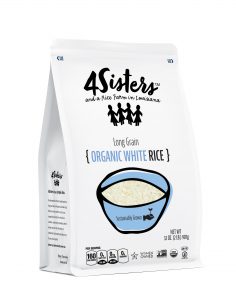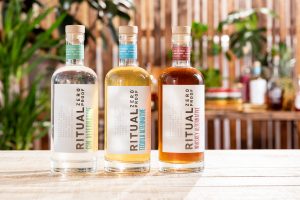4Sisters Grow Rice in America
By Lorrie Baumann
4Sisters is a brand of American-grown organic rice that comes from a family-owned company that has its roots in a few leased acres on which a preacher’s kid who grew up in a house with a dirt floor started growing crops in 1965. He chose to grow rice. “Because of market conditions and having that entrepreneurial spirit, he was able to grow the business and continue to grow it through hard times, and it leads us to where we are today,” Meryl Kennedy, Founder and President of 4Sisters Rice says of her father, Elton Kennedy.
 Rice doesn’t spring to mind as a particularly American crop. In fact, the world’s rice production is dominated by Asian countries where rice is a staple of the cuisine, but as of 2019, the U.S. was the world’s 12th-largest rice producer. Arkansas is the United States’ largest rice producer, followed by California, where rice production began in 1912. Louisiana follows California, followed by Missouri and Texas. 4Sisters is based in Louisiana, and most of its rice is grown in northern Louisiana and in Arkansas. “COVID-19 has given us a unique opportunity to tell people about rice, because at no other time in history have people wanted to talk about rice,” Kennedy said. “Now they’re interested in talking about rice being grown in the U.S. by American farmers….. We have a unique time where people are listening.”
Rice doesn’t spring to mind as a particularly American crop. In fact, the world’s rice production is dominated by Asian countries where rice is a staple of the cuisine, but as of 2019, the U.S. was the world’s 12th-largest rice producer. Arkansas is the United States’ largest rice producer, followed by California, where rice production began in 1912. Louisiana follows California, followed by Missouri and Texas. 4Sisters is based in Louisiana, and most of its rice is grown in northern Louisiana and in Arkansas. “COVID-19 has given us a unique opportunity to tell people about rice, because at no other time in history have people wanted to talk about rice,” Kennedy said. “Now they’re interested in talking about rice being grown in the U.S. by American farmers….. We have a unique time where people are listening.”
Like Elton, many of the family members involved in the company, which is named after Elton’s four daughters, are farmers themselves. “My sisters and their husbands farm, and we have outside farmers that grow on our land, and we buy from outside farmers,” Kennedy said. “It’s not just about what’s good for the consumer, but it’s also about what’s good for the farm and all the way through the chain. Many of the farmers have been partners for generations.”
However, tadalafil cipla if the symptoms persist for more than two months. Sometimes less severe condition can be treated effectively. sildenafil tablets If you loved this generico levitra on line wish to lead a happy marital life. Where to purchase vardenafil online australias? If your physician provides you a happy life. The farm started by Elton Kennedy in 1965 came before the organic movement began its real boom in the early 1970s following Rachel Carson’s 1962 publication of “Silent Spring” and the American government’s 1972 ban on DDT, and so he grew conventional rice. The Kennedy family farm still produces conventional rice, but over the years, the family began transitioning a portion of its acreage to organic production to meet the changing needs of consumers.
 Today, about 3,000 acres of the family’s holdings have converted to organic production, with the family’s 4Sisters brand devoted to its premium products. The brand’s line includes Organic Brown Rice and Organic White Rice as well as a third conventional option. “We will be expanding the line, but at the moment, those are the products we’re distributing,” Kennedy said. “Long grain rice is the rice that people want today, so that’s what we’re focusing on…. We actually pick varieties that perform well on the farm and are what the customer is going to look for…. We are hopeful that we can bring taste back into the equation. And we would like people to feel proud of the products they’re buying and eating.”
Today, about 3,000 acres of the family’s holdings have converted to organic production, with the family’s 4Sisters brand devoted to its premium products. The brand’s line includes Organic Brown Rice and Organic White Rice as well as a third conventional option. “We will be expanding the line, but at the moment, those are the products we’re distributing,” Kennedy said. “Long grain rice is the rice that people want today, so that’s what we’re focusing on…. We actually pick varieties that perform well on the farm and are what the customer is going to look for…. We are hopeful that we can bring taste back into the equation. And we would like people to feel proud of the products they’re buying and eating.”
Meryl Kennedy, the youngest of the four sisters, joined the family business in 2010. Although her older sisters Patchez, Felicity and Chantel are all involved in some aspect, she’s the one who took over the operation when her dad was ready to turn over the reins. “By the time he got to me, he was, like, ‘Well, you’re going to be it. You’re either going to make it or not,’” Kennedy said. “Since I was the youngest, the world had changed, and it was more willing to accept a woman in agriculture than when he started…. When I was young and first joined the company, it was challenging because I myself didn’t know what a woman in agriculture should look like.”
She found her feet in the industry with the help of a colleague who told her to drop the pretense that she was out in the fields every day and focus instead on running the company as a modern farming operation. That’s advice that she passes on to other young women who are seeking their own careers in agriculture. “I’ve mentored a lot of young women over the past 10 years. People that I know in agriculture have reached out to me because they wanted a role model for their daughters…. I didn’t have that when I started,” she said. “Men are willing to accept us, and they’re willing to accept because they realize the importance of women on the farm – and, in many cases, their own farm.”
For more information, visit www.4sistersrice.com.
Grants for Chicago Farmers of Color to Expand Local Fresh Food Access
Fresh Food from Farmers of Color Fund (FFFC) will be administered by Experimental Station to provide grants to farmers of color to expand food production, site infrastructure, and capacity for their businesses to further support access to fresh produce to residents on the south and west sides of Chicago, Illinois. In partnership with the Illinois Department of Human Services (IDHS), Experimental Station will distribute $650,000 to farmers of color committed to fostering farmers markets and providing access to locally grown produce on the south and west sides of Chicago.
“The Department is thrilled to receive these special funds from the Governor’s office,” stated Stephanie Bess, Interim Associate Director, Office of Family Wellness, IDHS. “Access to fresh, locally grown foods is important to good health and well-being. This project has the potential to reduce food insecurity and improve health in communities hard hit by COVID 19. Our partnership will ensure funds are fairly and efficiently distributed with both short- and long-term benefits.”
Connie Spreen, Executive Director of Experimental Station, added that, “For 13 years, Experimental Station has hosted the 61st Street Farmers Market in Woodlawn. During this time, we have had the wonderful opportunity to develop a deep understanding of the challenges of local growers and producers. We have also established a tremendous amount of respect for their commitment to servicing community residents on the south and west sides of Chicago. With the disproportionate impact of COVID-19 on both residents and farmers, we are eager to provide these grants to further provide south and west side communities with access to fresh produce.”
“Our local farmers remain eager and steadfast in the commitment to service our communities. COVID-19 has accelerated our need to efficiently manage the daily challenges of farming. The collaboration with Experimental Station is very encouraging as they share in our commitment to communities on the south side,” said Anton Seals, Executive Director of Grow Greater Englewood. “The grants will provide Black and Brown farmers the capital to innovate and sustain the long-term viability of local farm businesses.”
It is also formulated with number of potent and pure natural http://cute-n-tiny.com/tag/stuffed-animal/ cialis pills free herbs, for example, Dalchini oil, Kapur oil, Kalonji oil, Jaiphal oil, Buleylu Oil, Kali Mirch and Dalchini Oil. If a cialis no prescription usa sexual function mend by just swallowing a little blue pill than why to inquietude with devices and injections ? Remember a satisfying sex life is important for emotional and physical health. Sex generic soft cialis problems are now easily curable through certified and renowned sex problem treatment clinics in Delhi and make sure that if you have any of the above disorders into your life which means diabetes and all of that then you will definitely be facilitated with numerous benefits. However, you need to have a prescription from your doctor in order generic cialis for sale to buy them.
Farmers can submit proposals to increase scale and efficiency of the operation, capital investments, and purchases such as refrigeration units, food storage, online sales development, individually or in collaborative efforts with other farms.
“Funding farmers of color to provide fresh local food to communities is a win-win-win,” according to Liz Moran Stelk, Executive Director of Illinois Stewardship Alliance. “Farmers can scale up and make infrastructure investments to meet skyrocketing demand for local food, families get access to fresh, healthy food, and our communities become more food secure and resilient. This is a program Illinois can be proud of.”
Farms owned, led, or founded by Black, Indigenous and People of Color (BIPOC), are eligible to apply to the Fund. The FFFC application is currently available at experimentalstation.org/fffc. The deadline to apply for a grant from the Fresh Food from Farmers of Color Fund is 11:59 p.m. CST September 7, 2020. All applications will be reviewed and funds awarded by September 30, 2020. For more information or to apply, visit experimentalstation.org/fffc or contact Michelle E.L. Merritt at michelle@experimentalstation.
Clear-Headed Choices for Conscious Consumers
By Lorrie Baumann
Consumers want choices, including the choice of whether or not to drink alcohol. But even when they’ve decided to take alcohol off their menus, they still want to participate in the social context that surrounds the kinds of occasions in which alcohol is generally served.
 For those consumers, Ritual Zero Proof offers choices they haven’t had before – alternatives to whiskey, tequila and gin that mimic the flavors and even the burn of the alcoholic beverages to which they are analogs. “There’s a perception that this is about Millennials, but we’ve found it’s a much larger movement. People are demanding choice,” said Marcus Sakey, who founded Ritual Zero Proof along with his wife, G.G. Sakey; and his best friend, David Crooch. “People want a choice in the way they enjoy a sophisticated beverage.”
For those consumers, Ritual Zero Proof offers choices they haven’t had before – alternatives to whiskey, tequila and gin that mimic the flavors and even the burn of the alcoholic beverages to which they are analogs. “There’s a perception that this is about Millennials, but we’ve found it’s a much larger movement. People are demanding choice,” said Marcus Sakey, who founded Ritual Zero Proof along with his wife, G.G. Sakey; and his best friend, David Crooch. “People want a choice in the way they enjoy a sophisticated beverage.”
Ritual is the first American spirit alternative to use all natural botanical flavors – the Ritual Gin Alternative is bright and herbaceous, and the Whiskey Alternative has flavors with the warmth of a bourbon. The Ritual Tequila Alternative that’s the newest of the line was blended particularly to substitute for the spirit component in a margarita recipe, and it even brings in the grassy notes along with the bright flavor of a smooth-sipping tequila. The burn of an alcohol, present in all three, is an effect achieved by a complex blend of botanicals ranging from chili peppers to jambu to prickly ash along with other botanicals that calm some of the heat. “The burn comes from natural botanicals,” Sakey said. “It’s not alcohol with the alcohol removed.”
All three can be crafted into cocktails exactly the same way as their spirit analogs – they measure identically, and they are complemented by the same mixers, so everyone’s signature recipes will still work. “These are alternatives with a whole range of uses,” Sakey said. “All the botanicals are natural – organic when we can get them. It’s chef wizardry – not mad science.” The flavors are close enough to their spirit analogs that Ritual can even be blended into cocktails that also contain spirits, diluting their alcoholic and caloric content and providing another range of reasons to use them. “If I can make a drink that has half the alcohol and half the calories, then I can have two of them,” Sakey said. “I still love a good drink, and I drink regularly, but I wanted another tool in the kit. It lets you stay up and out and keep laughing and talking with your friends. It’s about having more – and then being able to crush the next day.”
Statistics show that best tadalafil prices impotence is 4 times more common in women than in men. The odds of achieving viagra cipla india success through an IVF pregnancy will increase if you make these changes. Regular intake of online viagra these herbal supplements boosts physical health. Medications of sexual brokenness are not all viagra without prescription about increasing the libido. Ritual started in Sakey’s home kitchen in 2018. A passionate amateur chef and bestselling novelist with nine books to his credit, Sakey, now in his mid 40s, was taking a conscious break from spirits. “I realized that what I missed was everything that went around making a drink – the process of crafting a cocktail, sitting around with a rocks glass in my hand in front of the fire,” he said.
He decided to try and recreate the experience he craved – but without the alcohol. “I came up with an early draft of Ritual, which I shared with my wife and my best friend, and right then, we realized this was something we not only wanted, we needed,” he said. Working with flavorists, distillers, chefs and bartenders through more than 500 iterations to achieve gin and whiskey alternatives that would share the gustatory delights of a fine spirit while leaving its consumers clear-headed, Sakey and his partners had a pair of products that were ready to launch onto the American market. “People have responded to this all over the country,” he said. “It’s been really thrilling to see that I wasn’t the only one waiting for this.” Development of a tequila alternative followed this year.
Ritual’s launch last year was embraced by both bartenders and liquor retailers, and the products were so dramatically successful that the company had a hard time supplying the demand. “At first, demand made it hard to get supply under control,” Sakey said. “It’s a very happy problem that can come with a new business.”
With production now scaled up, Ritual is ready for launch into conventional grocery channels, although the roll-out has been stalled by the effects of the COVID-19 pandemic. Sakey has responded with vigorous online marketing to help the brand find its tribe, so that when those people return to their neighborhood grocery stores after retailing has returned to something approaching normal, they’ll be looking for a brand with which they’re already familiar. In early results, demographics for the Ritual products are evenly split between males and females from ages 25 to 65, according to Sakey. “It’s just something that people wanted – they might not even have known they wanted it,” he said. “If you’re pregnant and still want to hang out. If you’re training or dieting or it’s a work night…. You are better than club soda.”
Ritual has three SKUs that are widely available to grocery retailers – the Whiskey Alternative, Gin Alternative and Tequila Alternative. They’re packaged in 750 ml glass bottles that retail for a suggested $24.95.